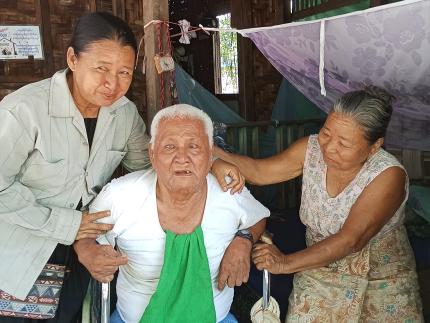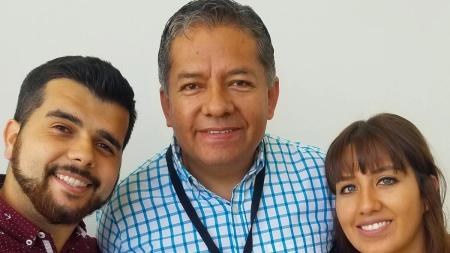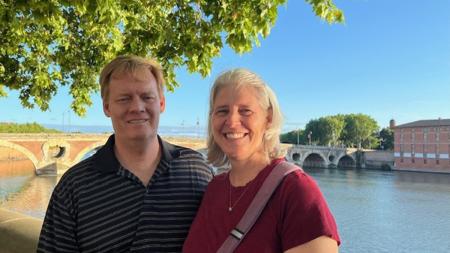People Seeking Hope

Naw Htoo Baw, 49, is an English teacher who has devoted her life to taking care of her parents. So, when a 7.7 magnitude earthquake, followed closely by a 6.4 magnitude quake, rocked Myanmar on March 28, Baw said, her first concerns were for her parents’ safety.
“I was in school when the earthquake struck,” shared Baw. “I hurriedly ran to our house, thinking of my 85-year-old paralyzed father and my 75-year-old mother. From a distance, I saw our two-story house reduced to one-story. I was frantically shouting, calling my parents’ names, but I could not hear any response, and I could not find them.”
Baw’s story is not unique. For days following the earthquakes, people searched for missing loved ones, endangering their own lives while searching severely damaged structures and piles of rubble that were once homes. For some of those people, their search ended in heartbreak, and while some families continued to focus on the missing, others sat in makeshift shelters thinking about rebuilding their homes.
Because of ongoing civil unrest in Myanmar, humanitarian workers who would typically swarm in after such a disaster have not yet arrived with excavation equipment, so survivors have used whatever tools they have at their disposal – sometimes their bare hands – to dig through the rubble and move blocks of mortar. Rebuilding will be a long and tedious process, and in the interim people sleep under tents – or, worse, in the streets with no protection from the elements.
Baw’s parents were fortunate. “As I kept on shouting, crying, and looking for them, our neighbors came and told me that they had carried my father and assisted my mother to a safe place,” Baw said with tears of gratitude running down her cheeks. “With much anticipation, I ran to our neighbor’s house and saw my parents shaking and crying. We embraced and started to thank God for saving their fragile lives.”
The family is now living in a makeshift shelter, which is not ideal – especially for Baw’s father, who is recovering from a stroke and has to use a wheelchair to get around. Baw is the family’s sole breadwinner, and she worries about how she will provide for her elderly parents. The family needs food, hygiene items, and medicine. And they need to rebuild their home.
World Renew’s local church partner has been working to share God’s hope in Myanmar—one of just a few organizations able to do so amid the ongoing conflict in the country. Baw’s family is one of about 200 households severely affected by the earthquake who have received food packs, hygiene kits, and a water filter from this church partner.
Baw and her parents are grateful for this support. Baw’s father, Albert Soe Lwin, sitting in his wheelchair, said over and over, “Thank you, thank you. I am alive.”
Baw is also thankful, she said, for church volunteers who supported her family in demolishing their house and clearing away the debris and rubble. She hopes she can save enough money to build a decent house for them to live in.
Since the two earthquakes shook Myanmar two months ago, records show that the disaster claimed over 5,000 lives, left hundreds of people injured and displaced thousands. World Renew Asia staff members have been on the ground in Myanmar and have witnessed the effects of heartbreak in their interactions with survivors.
“As we roamed around Mandalay, we saw buildings that are still leaning and tilting and buildings that are still undemolished and posing a major hazard,” shared one aid worker. “We visited camps—tents built on the sidewalks and near the railroads. During our visit, the temperature reached almost 40°C [104°F]. People do not sit in their tents but take comfort under the trees.”
“How long will these people endure these very challenging conditions?” he asked. “Please share your blessings. If you cannot help them financially, at least pray for them.”
“At World Renew, we have grown accustomed to the media moving on,” said Garry Mayhew, head of humanitarian and emergency affairs for the agency. “The first few days following a disaster, headlines are flooded with stories about the destruction and the people impacted. However, we are accustomed to being there after the cameras have left, and it is only humanitarian organizations working with local governments to reach those impacted who remain.”
In Myanmar, he added, the situation is even more challenging. “There is limited access for humanitarian organizations,” he explained. “World Renew is grateful to have on-the-ground church partners who are able to work, often risking their lives, to deliver food and other essentials, and, more importantly, to deliver hope for the most vulnerable.”
To learn more, visit worldrenew.ca/earthquakes in Canada or worldrenew.net/myanmar-earthquake-response in the United States.


